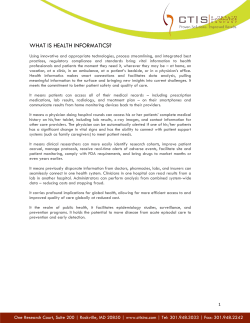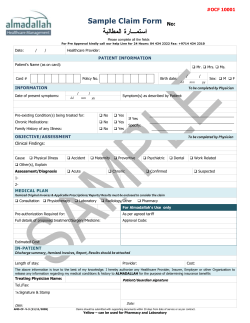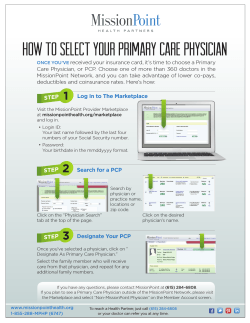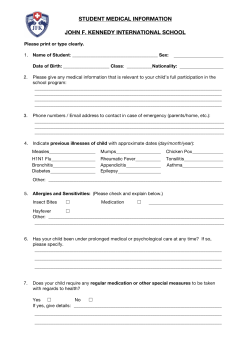
Get It Checked – poster for men
MEN: Get It Checked. Checkup and Screening Guidelines for Men Checkups and Screenings When? Physical Exam Every 3 years Every 2 years Every year a Every year a a a Should be done on occasion of exposure or suggestive symptoms at direction of physician. Some occupations may require more frequent testing for public health indications. Every 5 years a a a Blood Tests & Urinalysis Every 3 years Every 2 years Every year a Baseline Every 2 years Every year Age 30 Every 10 years a a a Every Year a a a Every Year * a Every Year a a Review overall health status, perform a thorough physical exam, and discuss health related topics. Blood Pressure High blood pressure (hypertension) has no symptoms, but can cause permanent damage to body organs. TB Skin Test Screens for various illnesses and diseases (such as cholesterol, diabetes, kidney or thyroid dysfunction) before symptoms occur. EKG Electrocardiogram screens for heart abnormalities. Tetanus Booster Prevents lockjaw. Rectal Exam Screens for hemorrhoids, lower rectal problems, colon and prostate cancer (see PSA Blood Test, below). PSA Blood Test Prostate Specific Antigen (PSA) is produced by the prostate. Levels rise when there is an abnormality such as an infection, enlargement or cancer. Testing should be done in collaboration with your physician. Ages 20-39 40-49 50+ a a a a a a *Some medical associations recommend that men speak to their health care providers about a baseline PSA blood test at age 40. Men at high risk, including African Americans, should consider an annual prostate exam beginning at age 40. Hemoccult Screens the stool for microscopic amounts of blood that can be the first indication of polyps or colon cancer. Colorectal Health A flexible scope examines the rectum, sigmoid and descending colon for cancer at its earliest and treatable stages. It also detects polyps, which are benign growths that can progress to cancer if not found early. Every 3-4 Years Chest X-Ray Discuss with a physician Bone Health Discuss with a physician Should be considered in smokers over the age of 45. The usefulness of this test on a yearly basis is debatable due to poor cure rates of lung cancer. Bone mineral density test. Testing is best done under the supervision of your physician. Self Exams Testicle: To find lumps in their earliest sages. Skin: To look for signs of changing moles, freckles, or early skin cancer. Oral: To look for signs of cancerous lesions in the mouth. Breast: To find abnormal lumps in their earliest stages. Testosterone Screening Monthly by self Low testosterone symptoms include low sex drive, erectile dysfunction, fatigue and depression. Initial screening for symptoms with a questionnaire followed by a simple blood test. Discuss with a physician Sexually Transmitted Diseases (STDs) Under physician supervision Sexually active adults who consider themselves at risk for STDs should be screened for syphilis, chlamydia, HIV, and other STDs. Men’s Health Network does not provide medical services but provides this maintenance schedule as a reminder of your need to take responsibility for safeguarding your health. Regular checkups and age-appropriate screenings CAN improve your health and reduce premature death and disability. You should consult your health care provider to determine if these screenings are right for you and about the benefits of earlier screenings, especially if you are a member of a high risk group or have a family history of disease. For more information about men’s health, contact: Men’s Health Network: 202-543-MHN-1, www.menshealthnetwork.org a a a Age 60 a a a a a a a a
© Copyright 2025





















